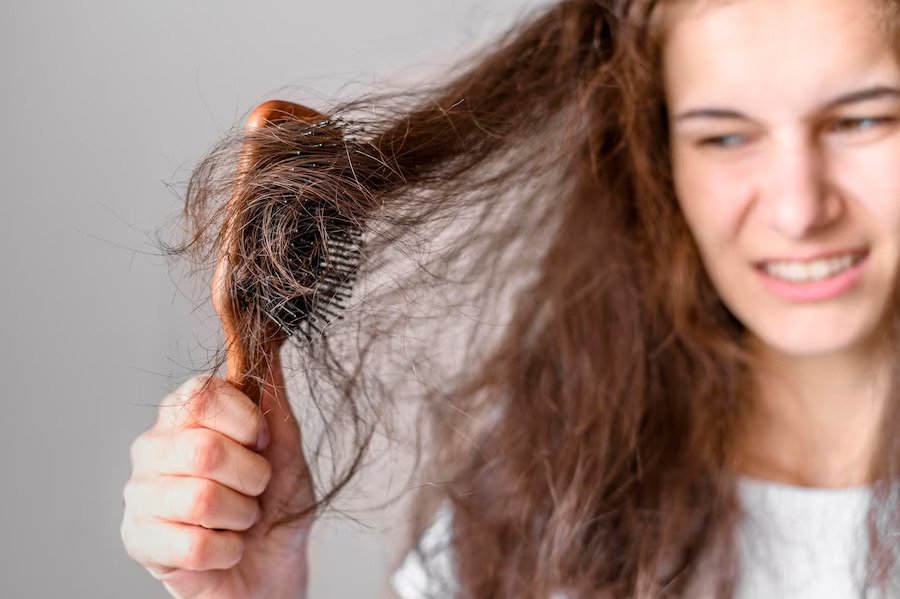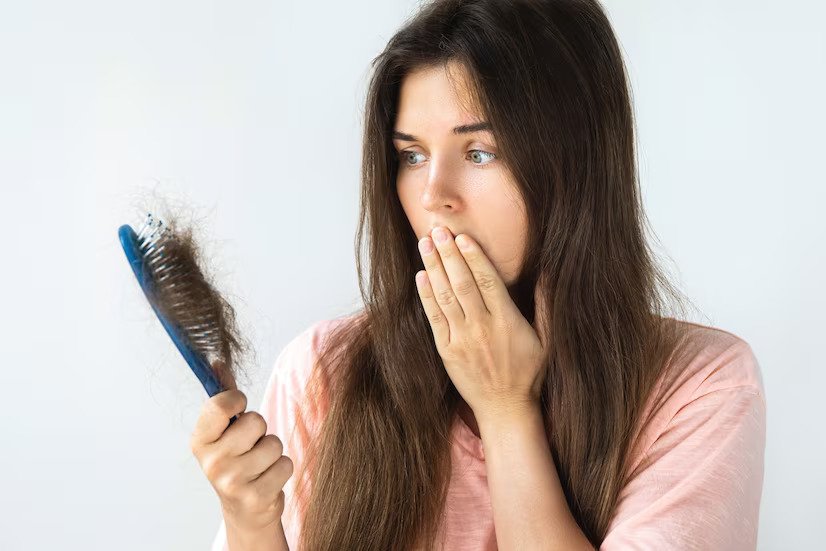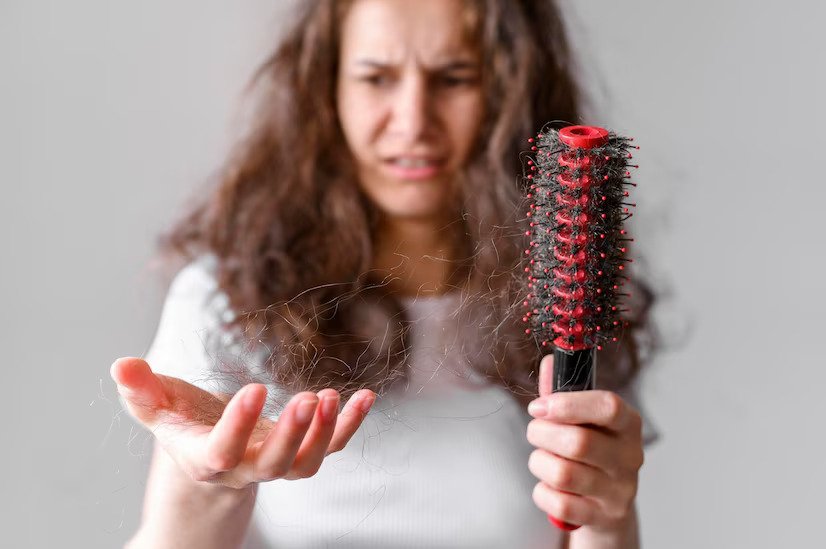Hair Loss Myths Debunked: Sorting Fact from Fiction
- 1 Common Hair Loss Myths You Often Heard When Hair Loss Occurs
- 1.1 Myth 1: You can only lose your hair when you get old
- 1.2 Myth 2: Men who don’t have hair have more testosterone
- 1.3 Myth 3: Your hair falls faster if you wear a hat too often
- 1.4 Myth 4: Your hair is falling out because of stress
- 1.5 Myth 5: If you wash your hair too often, you’ll lose hair
- 1.6 Myth 6: MSG causes hair loss
- 1.7 Myth 7: Washing your hair every day will make you lose your hair
- 1.8 Myth 8: Tying your hair the same way every day will not affect hair growth
- 1.9 Myth 9: Too much sun contact makes hair fall out
- 1.10 Myth 10: Shampooing your hair too often is bad
- 2 The Best & Worst Ways to Handle Hair Loss Misconceptions & Tackle Temporary Hair Loss
- 2.1 Best ways to solve hair fall: Medication
- 2.2 Hair transplant
- 2.3 Low-level laser therapy
- 2.4 Worst ways to stop hair loss: Supplements
- 2.5 Snake oil
- 3 Conclusion
Hair loss is a widespread disease affecting millions of people worldwide. People experiencing hair loss may feel confused and worried due to the widespread prevalence of myths and incorrect beliefs about the condition. We’ll dispel some common misconceptions regarding balding and hair loss here so you can protect your hair from further damage!
Common Hair Loss Myths You Often Heard When Hair Loss Occurs
Many people in Singapore lose their hair, mainly because the weather there is hot and sticky. However, there are also a lot of myths and false beliefs about what causes hair loss and how to treat it. These can keep people from getting help or caring for their hair health. In this article, we’ll bust some of the most popular myths about hair loss and explain why experts and scientists say they’re wrong.
Myth 1: You can only lose your hair when you get old
This is the biggest and most commonly heard misconception among all the hair loss myths. Depending on the cause, hair loss can happen at any age. Hair loss is more common as we get older, but that doesn’t mean it’s inevitable or can’t be stopped, as hair loss can also be caused by changes in hormones, medical problems, medications, worry, or not getting enough nutrients.
In Singapore, hair thinning is a prevalent condition that affects a large population. According to a survey conducted by a hair care company, approximately forty percent of Singaporeans experience hair loss by age thirty-five. The primary cause of hair loss is genetic, meaning it is passed down from one’s progenitors. Stress, hormonal changes, medical conditions, medications, diet, and lifestyle behaviors are additional factors that may contribute to hair loss.
So, hair loss begins at no set age, as it fluctuates from individual to individual and depends on the underlying cause. However, indicators of hair loss include hair thinning, a receding hairline, bald patches, excessive shedding, and alterations in hair texture.
Myth 2: Men who don’t have hair have more testosterone
Fact: Being bald is not a sign of having too much testosterone. The hormone dihydrotestosterone (DHT), which is made from testosterone, is the leading cause of baldness. DHT sticks to the hair cells, which makes them shrink and stop making hair in the long run.
But this doesn’t mean that guys who don’t have hair have more testosterone than men who do. It just means that the hair cells on their heads are more sensitive to DHT. The amount of testosterone in the blood does not change when people lose their hair.
Myth 3: Your hair falls faster if you wear a hat too often
Wearing a hat does not make you lose your hair or go bald. There is no scientific proof that hats can make your hair fall out or hurt your skin. If your hat is clean and fits well, it won’t hurt the health of your hair. Hats can protect your scalp from sun damage, which can cause inflammation and early aging of the face, provided that you keep your hat and cap clean and wash them often.
Myth 4: Your hair is falling out because of stress
Stress can cause short-term hair loss but can’t make you bald. Stress can have many effects on your body, like messing up the way your hair grows. When stressed, your body may move more hairs into the sleeping phase (telogen). This means that more hairs will come out when you wash or comb your hair.
This hair loss, called telogen effluvium, usually goes away within a few months after the stressor is gone. However, worry does not cause male or female pattern baldness, which is permanent hair loss caused by genes and hormones.
Myth 5: If you wash your hair too often, you’ll lose hair
Washing your hair does not cause you to lose hair or go bald. When you shampoo your hair, it is customary to lose a few hairs. Shampooing helps remove dead skin cells and dirt from your head. But this doesn’t mean that you’re losing more hair than usual or that washing your hair is terrible for your hair health.
On the contrary, washing your hair often helps keep your scalp clean and healthy, avoiding infections and inflammation that can damage your hair follicles. It depends on how usually you like to wash your hair and what kind of hair you have, but most people should wash their hair at least once or twice a week.
Myth 6: MSG causes hair loss
MSG, which stands for monosodium glutamate, is a taste enhancer often used in Asian food. Some people think eating MSG can cause them to lose their hair, but this is not true.
There is no solid evidence that MSG causes hair loss or slows hair growth. But a healthy, well-balanced diet can give your body the nutrients to keep hair from falling out. Choose foods like eggs and fresh greens high in protein and vitamin B.
Myth 7: Washing your hair every day will make you lose your hair
Some people think that washing your hair daily can take away the natural oils it needs and cause you to lose hair. But neither of these things is true. When you wash your hair daily, you eliminate dirt, chemicals, and extra sebum that can build up on your head and block your hair follicles.
This action can keep your skin from getting infected or inflamed, hurting your hair and making it fall out. But it would be best to use a gentle and right shampoo for your hair type and state. You also shouldn’t use hot water or rub your scalp too hard.
Myth 8: Tying your hair the same way every day will not affect hair growth
In Singapore’s weather, it’s easy to keep your hair out of your face by putting it in a ponytail or bun. However, doing this daily can cause traction alopecia, a slow loss of hair caused by pulling or pulling on the hair repeatedly. This can hurt the hair cells and make them weaken or scar over time.
To prevent this, try to tie your hair loosely and change how you do it often. Also, it would be best not to use rubber bands or metal clips on your hair because they might cause hair breakage.
Myth 9: Too much sun contact makes hair fall out
The sun always affects Singapore’s weather, but does it do anything to your hair? Some people overthink the sun can damage the hair shafts or cells and cause hair loss. But neither of these things is true.
Generally speaking, sunlight doesn’t directly cause hair loss but can make your hair dry, brittle, and more likely to break. If you often have to work or stay under bright sun, use a conditioner or serum with UV screens or antioxidants and wear a hat or scarf outside to protect your hair and scalp health from sun damage.
Myth 10: Shampooing your hair too often is bad
The last myth we’ll bust is that washing your hair too often is bad for your skin and can make you lose hair. This is false because shampooing cleans your head and removes dirt, oil, and bacteria that can hurt your hair. But it would be best if you didn’t overdo it because shampooing too often or using harsh products can strip your hair of its natural moisture and throw off its pH balance.
This can make your skin dry, itchy, or irritated, which can slow hair growth. The best way to shampoo your hair is to use a gentle shampoo that fits the condition of your scalp and wash your hair every other day or as needed.
The Best & Worst Ways to Handle Hair Loss Misconceptions & Tackle Temporary Hair Loss
Hair fall is a common problem, and men often feel that hair loss is permanent since they consistently lose more hair when they get closer to middle age. Thankfully, plenty of hair regrowth solutions claim they can stop or stop further hair loss nowadays, but not all of them work or are safe. Here are some of the best and worst things you can do to treat hair loss.
Best ways to solve hair fall: Medication
Minoxidil is a medication that you put on your hair twice a day. It makes the blood move faster, and the hair grow faster. It can stop or slow hair loss and help some people grow hair back, whereas Finasteride is a pill you get from a doctor and take once a day. It stops the hormone DHT, which shrinks and kills hair cells. It can prevent hair loss and help some guys grow hair back.
Hair transplant
A hair transplant is a surgical process in which healthy hair follicles are moved from one part of your scalp to another, where you are losing hair or going bald. It can give you a lasting look that looks natural and boosts your self-confidence, so it is considered one of the best ways to solve your worries.
However, it can be costly and painful and may need more than one session and time to heal. It also has some risks, like getting an illness, scars, or not growing well.
Low-level laser therapy
Low-level laser therapy (LLLT) is a kind of treatment that uses light with a low strength to make hair grow back. It sends more blood and oxygen to the head, which helps nourish the hair follicles and stop further hair loss. LLLT can help both men and women with androgenetic alopecia, a type of hair loss that is caused by genes.
It uses a device that sends low-level laser light to your head to increase blood flow and hair growth. This generally stops hair loss without pain, is noninvasive, and has no known side effects. However, seeing the impact may take a few months of regular sessions, so most people buy a bundle to get a better deal.
Worst ways to stop hair loss: Supplements
These pills or powders contain vitamins, minerals, herbs, or other ingredients that claim to nourish your hair and stop or cure hair loss. However, no scientific evidence shows that supplements can adequately treat hair loss. Some supplements could also hurt you or cause problems with other medicines you are taking. Before taking any medication for hair loss, you should always talk to your doctor first.
Snake oil
Snake oil is commonly mentioned in many products that say it can stop hair loss but don’t have any proof or authority to back it up. Some of these products are shampoos, conditioners, oils, creams, sprays, and devices that claim to help your hair grow back quickly or with little effort.
Most of the time, these goods are scams that take advantage of your desperation and fear, and snake oil is just one of them. To keep your hair condition healthy, it is vital to consult professionals for legitimate hair loss treatments instead of trusting different kinds of DIY or hair loss myths to overcome the issue by yourself.
Conclusion
Although many men experience hair loss, you should remember that this is not permanent, and treatments are available. The common misconceptions, however, are often not supported by science and are simple to dispel. Thus, be sure to do your fact check and think twice before trusting all hair loss myths so you can let your hair remain healthy and confident!
Frequently Asked Questions (FAQs)
What does “male pattern hair loss” mean?
MBP is a common type of hair loss that happens to most guys at some point in their lives. It is caused by a mix of genetic and hormonal factors that shrink the hair cells and make the hairs shorter and thinner. Most of the time, MPB starts with a thinning hairline or a bald spot on the top of the head. Over time, it can cause the hair to fall out completely.
What is hair loss in women?
Female pattern hair loss (FPHL) is a less common type of hair loss that happens to some women, especially after menopause. It can also be caused by genes and hormones that shrink the hair cells and make the hairs thinner and shorter. Most of the time, FPB causes hair loss all over the scalp, but it is most noticeable on the top and front of the head. It rarely causes you to lose all of your hair.
Where is the hair shaft located?
The part of the hair that can be seen above the skin is called the hair shaft. It has three layers: the medulla in the middle, the brain in the middle, and the cuticle on the outside. Keratin is a protein that gives hair strength and flexibility. It is found in the medulla and the cortex. The cuticle is a layer of cells that cover each other and keep the hair from losing moisture and getting hurt.
What does hereditary hair loss mean?
Genetic hair loss is any kind of hair loss that can be traced back to your genes. How sensitive your hair follicles are to hormones like dihydrotestosterone (DHT), which can cause them to shrink and stop making hair, depends on your genes. Both men and women can lose their hair because of their genes, but the pattern and harshness of it tends to be different for each sexe.
How can I fix or stop hair loss that is caused by my genes?
There is no fix for genetic hair loss, but there are ways to slow it down, stop it, or even grow back some of the hairs that have been lost. Some of these methods are minoxidil, finasteride, laser therapy, platelet-rich plasma therapy, and hair transplant surgery. But these treatments may have side effects, limits, or costs that you should think about before using them. You should talk to your doctor or a dermatologist about the best way to treat your condition.



















